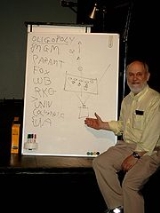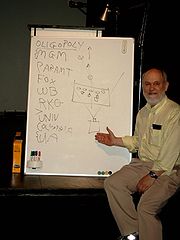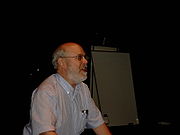
David Bordwell
Encyclopedia

Film theory
Film theory is an academic discipline that aims to explore the essence of the cinema and provides conceptual frameworks for understanding film's relationship to reality, the other arts, individual viewers, and society at large...
and film historian. Since receiving his PhD from the University of Iowa in 1974, he has written more than fifteen volumes on the subject of cinema including Narration in the Fiction Film (1985), Ozu and the Poetics of Cinema (1988), Making Meaning (1989), and On the History of Film Style (1997).
With his wife Kristin Thompson
Kristin Thompson
Kristin Thompson is an American film theorist and author whose research interests include the close formal analysis of films, the history of film styles, and "quality television", a genre akin to art film. She wrote two scholarly books in the 1980s which used an analytical technique called...
, Bordwell wrote the introductory textbooks Film Art (1979) and Film History (1994). With aesthetic philosopher Noël Carroll
Noël Carroll
Noël Carroll is an American philosopher considered to be one of the leading figures in contemporary philosophy of art. Although Professor Carroll is best known for his work in the philosophy of film, he works in general on philosophy of art, theory of media, and also philosophy of history...
, Bordwell edited the anthology Post-Theory: Reconstructing Film Studies (1996), a polemic on the state of contemporary film theory. His largest work to date remains The Classical Hollywood Cinema: Film Style and Mode of Production to 1960 (1985), written in collaboration with Thompson and Janet Staiger. Several of his more influential articles on theory, narrative, and style were collected in Poetics of Cinema (2007), named in homage after the famous anthology of Russian formalist film theory Poetika Kino, edited by Boris Eikhenbaum in 1927.
Bordwell spent the near-entirety of his career as a professor of film at the University of Wisconsin-Madison, where he is currently the Jacques Ledoux Professor of Film Studies, Emeritus
Emeritus
Emeritus is a post-positive adjective that is used to designate a retired professor, bishop, or other professional or as a title. The female equivalent emerita is also sometimes used.-History:...
in the Department of Communication Arts. He and Thompson maintain the blog "Observations on film art" for their recent ruminations on cinema.
Career
Drawing inspiration from earlier film theorists such as Noel Burch as well as from art historian E.H. Gombrich, Bordwell has contributed books and articles on classical film theory, the history of art cinema, classical and contemporary Hollywood cinema, and East-Asian film style. However, his more influential and controversial works have dealt with cognitive film theory (Narration in the Fiction Film being one of the first volumes on this subject), historical poetics of film style, and critiques of contemporary film theory and analysis (Making Meaning and Post-Theory being his two major gestures on this subject).Neoformalism
Bordwell has also been associated with a methodological approach known as neoformalism, although this approach has been more extensively written about by his wife, Kristin ThompsonKristin Thompson
Kristin Thompson is an American film theorist and author whose research interests include the close formal analysis of films, the history of film styles, and "quality television", a genre akin to art film. She wrote two scholarly books in the 1980s which used an analytical technique called...
. Neoformalism is an approach to film analysis based on observations first made by the literary theorists known as the Russian Formalists: that there is a distinction between a film's perceptual and semiotic properties (and that film theorists have generally overstated the role of textual codes in one's comprehension of such basic elements as diegesis and closure), and similarly that there is a distinction between plot form and story construction. For instance in a detective story, the murder comes at the beginning of the chain of events (story), but we find out the details about the murder at the end of the film (plot). Much of Bordwell's work involves analyzing the filmgoer's cognitive processes that take place when perceiving the film's non-textual, aesthetic forms. This analysis includes how films guide our attention to salient narrational information, and how films partake in 'defamiliarization
Defamiliarization
Defamiliarization or ostranenie is the artistic technique of forcing the audience to see common things in an unfamiliar or strange way, in order to enhance perception of the familiar...
', a formalist term for the basic purpose of art in our lives: to show us familiar and formulaic objects and concepts in a manner that encourages us to experience them as if they were new entities.
Neoformalists reject many assumptions and methodologies made by other schools of film study, particularly hermeneutic (interpretive) approaches, among which he counts Lacanian
Jacques Lacan
Jacques Marie Émile Lacan was a French psychoanalyst and psychiatrist who made prominent contributions to psychoanalysis and philosophy, and has been called "the most controversial psycho-analyst since Freud". Giving yearly seminars in Paris from 1953 to 1981, Lacan influenced France's...
psychoanalysis
Psychoanalytical film theory
Psychoanalytical film theory is a school of academic film criticism that developed in the 1970s and '80s, is closely allied with critical theory, and that analyzes films from the perspective of psychoanalysis, generally the works of Jacques Lacan....
and certain variations of post-structuralism
Post-structuralism
Post-structuralism is a label formulated by American academics to denote the heterogeneous works of a series of French intellectuals who came to international prominence in the 1960s and '70s...
. In Post-Theory: Reconstructing Film Studies, Bordwell and co-editor Noël Carroll
Noël Carroll
Noël Carroll is an American philosopher considered to be one of the leading figures in contemporary philosophy of art. Although Professor Carroll is best known for his work in the philosophy of film, he works in general on philosophy of art, theory of media, and also philosophy of history...
argue against these types of approaches, which they claim act as "Grand Theories" that use films to confirm pre-determined theoretical frameworks, rather than attempting to do middle-level research that can actually illuminate how films work. Bordwell and Carroll coined the term "SLAB theory" to refer to theories that use the ideas of Saussure
Ferdinand de Saussure
Ferdinand de Saussure was a Swiss linguist whose ideas laid a foundation for many significant developments in linguistics in the 20th century. He is widely considered one of the fathers of 20th-century linguistics...
, Lacan
Jacques Lacan
Jacques Marie Émile Lacan was a French psychoanalyst and psychiatrist who made prominent contributions to psychoanalysis and philosophy, and has been called "the most controversial psycho-analyst since Freud". Giving yearly seminars in Paris from 1953 to 1981, Lacan influenced France's...
, Althusser
Louis Althusser
Louis Pierre Althusser was a French Marxist philosopher. He was born in Algeria and studied at the École Normale Supérieure in Paris, where he eventually became Professor of Philosophy....
, and/or Barthes
Roland Barthes
Roland Gérard Barthes was a French literary theorist, philosopher, critic, and semiotician. Barthes' ideas explored a diverse range of fields and he influenced the development of schools of theory including structuralism, semiotics, existentialism, social theory, Marxism, anthropology and...
.
Many film scholars have criticized neoformalism, notably Slavoj Žižek
Slavoj Žižek
Slavoj Žižek is a Slovenian philosopher, critical theorist working in the traditions of Hegelianism, Marxism and Lacanian psychoanalysis. He has made contributions to political theory, film theory, and theoretical psychoanalysis....
, of whom Bordwell has himself been a long-time critic. Their criticism is generally not based on any internal inconsistencies in neoformalism. Rather, critics argue that neoformalism understates the role of culture and ideology in shaping the film text, specifically that film analysis reveals the problematic values of the societies in which these films are produced.

Select Articles
- The Art Cinema as a Mode of Film Practice Film Criticism 4:1 (Fall 1979); revised for Poetics of Cinema
- Textual Analysis, Etc. Enclitic 5:2 / 6:1 (Fall 1981 / Spring 1982); see also Textual Analysis Revisited Enclitic 7:1 (Spring 1983) written in response to Lawrence Crawford
- Lowering the Stakes: Prospects for a Historical Poetics of Cinema Iris 1:1 (1983)
- Mizoguchi and the Evolution of Film Language in Cinema and Language, eds. Stephen Heath and Patricia Mellencamp (AFI 1983)
- Jump Cuts and Blind Spots Wide Angle 6:1 (1984)
- Widescreen Aesthetics and Mise-en-Scene Criticism The Velvet Light Trap 21 (Summer 1985)
- A Salt and Battery (with Kristin Thompson) Film Quarterly, 40:2 (Winter 1986-87; from a polemic between Bordwell/Thompson and Barry Salt regarding The Classical Hollywood Cinema and Salt's own work on classical Hollywood style and technology
- ApProppriations and ImPropprieties: Problems in the Morphology of Film Narrative Cinema Journal 27:3 (Spring 1988
- Adventures in the Highlands of Theory Screen 29:1 (Winter 1988); from a polemic between Bordwell/Staiger/Thompson and Barry King regarding King's two-part review of The Classical Hollywood Cinema
- A Case for Cognitivism Iris 9 (Spring 1989); see also A Case for Cognitivism: Further Reflections Iris 11 (Summer 1990) written in response to Dudley Andrew
- A Cinema of Flourishes: Japanese Decorative Classicism of the Prewar Era in Directions in Japanese Cinema, eds. David Desser and Arthur Noletti (Indiana 1992); reprinted in Poetics of Cinema
- Cognition and Comprehension: Viewing and Forgetting in Mildred Pierce Journal of Dramatic Theory and Criticism 6:2 (Spring 1992); revised for Poetics of Cinema
- Film Interpretation Revisited Film Criticism 17:2-3 (Winter/Spring 1993); written in response to critics of Making Meaning
- The Power of a Research Tradition: Prospects for a Progress in the Study of Film Style Film History 6:1 (Spring 1994)
- Visual Style in Japanese Cinema, 1925-1945 Film History 7:1 (Spring 1995); revised for Poetics of Cinema
- Contemporary Film Studies and the Vicissitudes of Grand Theory in Post-Theory (UW-Madison 1996)
- Convention, Construction, and Cinematic Vision in Post-Theory (UW-Madison 1996); reprinted in Poetics of Cinema
- La Nouvelle Mission de Feuillade; or, What Was Mise-en-Scene? The Velvet Light Trap 37 (Spring 1996); revised for Figures Traced in Light
- Aesthetics in Action: Kung Fu, Gunplay, and Cinematic Expressivity in Fifty Years of Electric Shadows, ed. Law Kar (Urban Council / Hong Kong International Film Festival 1997); reprinted in Poetics of Cinema
- Richness through Imperfection: King Hu and the Glimpse in Transcending the Times: King Hu and Eileen Chan, ed. Law Kar (Urban Council / Hong Kong International Film Festival 1998); revised for Poetics of Cinema
- Transcultural Spaces: Toward a Poetics of Chinese Film Post Script 20:2 (2001)
- Film Futures Substance 97 (2002); reprinted in Poetics of Cinema
- Intensified Continuity: Visual Style in Contemporary American Film Film Quarterly 55:3 (Spring 2002); revised for The Way Hollywood Tells It
- Who Blinked First? How Film Style Streamlines Nonverbal Interaction Style and Story: Essays in Honor of Torben Grodal, eds. Lennard Hojbjerg and Peter Schepelern (Museum Tusulanum Press 2003); reprinted in Poetics of Cinema
- Schema and Revision: Staging and Composition in Early CinemaScope in Le CinemaScope Entre art et industrie, ed. Jean-Jacques Meusy (AFRHC 2004); revised for Poetics of Cinema
- Rudolf Arnheim: Clarity, Simplicity, Balance in Arnheim for Film and Media Studies, ed. Scott Higgins (Routledge 2010); an expanded revision of Simplicity, clarity, balance: A tribute to Rudolf Arnheim from davidbordwell.net (June 15, 2007)
Select Journal Issues
- Iris 9 (Spring 1989) Cinema and Cognitive Psychology; issue edited by Dudley Andrew, featuring essays by Bordwell (A Case for Cognitivism), Julian Hochberg, Virginia Brooks, Dirk Eitzen, and Michel Colin; in Iris 11 Bordwell responds to Andrew's characterization of cognitive film theory (A Case for Cognitivism: Further Reflections), followed by Andrew's reply
- Journal of Dramatic Theory and Criticism 6:2 (Spring 1992) Cognitive Science and Cinema; supplement edited by Edward S. Small, featuring essays by Bordwell (Cognition and Comprehension: Viewing and Forgetting in Mildred Pierce), Joseph Anderson, and Calvin Pryluck, as well as Noël Carroll's response to Warren Buckland's review of Mystifying Movies: Fads and Fallacies in Contemporary Film Theory (from Screen 30:4), a response which the editors of Screen supposedly refused to print
- Film Criticism 17:2-3 (Winter/Spring 1993), "Film Interpretation, Inc.": Issues in Contemporary Film Studies - issue dedicated to Making Meaning, featuring essays from Edward Branigan, RIck Altman, David A. Cook, Thomas Elsaesser, Robert B. Ray, and Robin Wood; Bordwell responds in length at the end (Film Interpretation Revisted)
- Style 32:3 (Fall 1998), Style in Cinema - issue edited by Bordwell, complementing On the History of Film Style and featuring essays by Noël Carroll, Lea Jacobs, Charles O'Brien, and Scott Higgins

